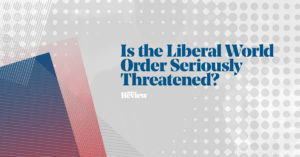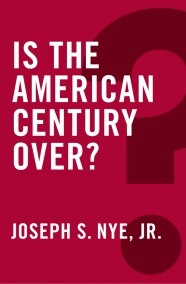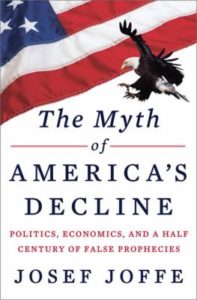 The “liberal international order” is one particular type of order, but hardly the only one that is possible, according to Rebecca Friedman Lissner, a Research Fellow at Perry World House, the University of Pennsylvania’s global policy research center, and Mira Rapp-Hooper, a Senior Research Scholar in Yale Law School’s Paul Tsai China Center.
The “liberal international order” is one particular type of order, but hardly the only one that is possible, according to Rebecca Friedman Lissner, a Research Fellow at Perry World House, the University of Pennsylvania’s global policy research center, and Mira Rapp-Hooper, a Senior Research Scholar in Yale Law School’s Paul Tsai China Center.
 From the early 1990s onward, unshackled from the constraints of Cold War competition, successive [U.S.] presidential administrations embraced the mantle of global leadership, and leveraged this position to spread democracy and free markets around the globe…..[but] Long-term socioeconomic trends now threaten political support for liberalism at home and abroad, they write for The Washington Quarterly:
From the early 1990s onward, unshackled from the constraints of Cold War competition, successive [U.S.] presidential administrations embraced the mantle of global leadership, and leveraged this position to spread democracy and free markets around the globe…..[but] Long-term socioeconomic trends now threaten political support for liberalism at home and abroad, they write for The Washington Quarterly:
These conditions sow fertile ground for populism, nativism, and nationalism to flourish—political movements that threaten to erode the very liberal-democratic roots of U.S. leadership of the postwar order. What is more, populism’s ascendance is evident not only in the United States, but throughout the West, as Europe, the United States’ most steadfast liberal partner, faces similar challenges. These fractures have foreboding implications for the West’s leadership of the international order, and for the cohesion of the liberal-democratic bloc itself.
 The system of security alliances, multilateral institutions, and relatively open economic policies that comprise Pax Americana or the “liberal international order” [is] being called into question by the rise of powers such as China and a new wave of populism within the world’s democracies, notes Joseph S. Nye,, the author of Is the American Century Over?
The system of security alliances, multilateral institutions, and relatively open economic policies that comprise Pax Americana or the “liberal international order” [is] being called into question by the rise of powers such as China and a new wave of populism within the world’s democracies, notes Joseph S. Nye,, the author of Is the American Century Over?
That architecture, also known as the “liberal international order,” was the stage where American power and authority unfolded for the last 70 years, Stanford University’s Josef Joffe writes for The American Interest. Recent developments do not necessarily mark America’s impending demise. But power unleavened by responsibility invariably provokes counter-power against Mr. Big, warns Joffe, author of The Myth of America’s Decline (W.W. Norton, 2014) as well as “Declinism’s Fifth Wave,” and “The Canard of Decline.”
 The greatest victory of the liberal international order was to create new stakeholders for its own survival outside of its original home. The liberal international order now has many pillars supporting it. Even if American power recedes or Eastern European democracy backslides, there are other centers of liberal power in the world, analyst Paul D. Miller writes in Non-“Western” Liberalism and the Resilience of the Liberal International Order for The Washington Quarterly:
The greatest victory of the liberal international order was to create new stakeholders for its own survival outside of its original home. The liberal international order now has many pillars supporting it. Even if American power recedes or Eastern European democracy backslides, there are other centers of liberal power in the world, analyst Paul D. Miller writes in Non-“Western” Liberalism and the Resilience of the Liberal International Order for The Washington Quarterly:
Liberal order need not rest exclusively on the fate of democracy in the West nor on the political will of American voters to underwrite the order. That liberal norms can and have taken root outside the West suggests that the liberal order has stakeholders around the world: India and Japan, for example, have as much to lose from the breakdown of liberal order as the United States and Europe. Liberal order started as a Western innovation and export and, for most of its existence, has been upheld by Western power. That need no longer be the case.







